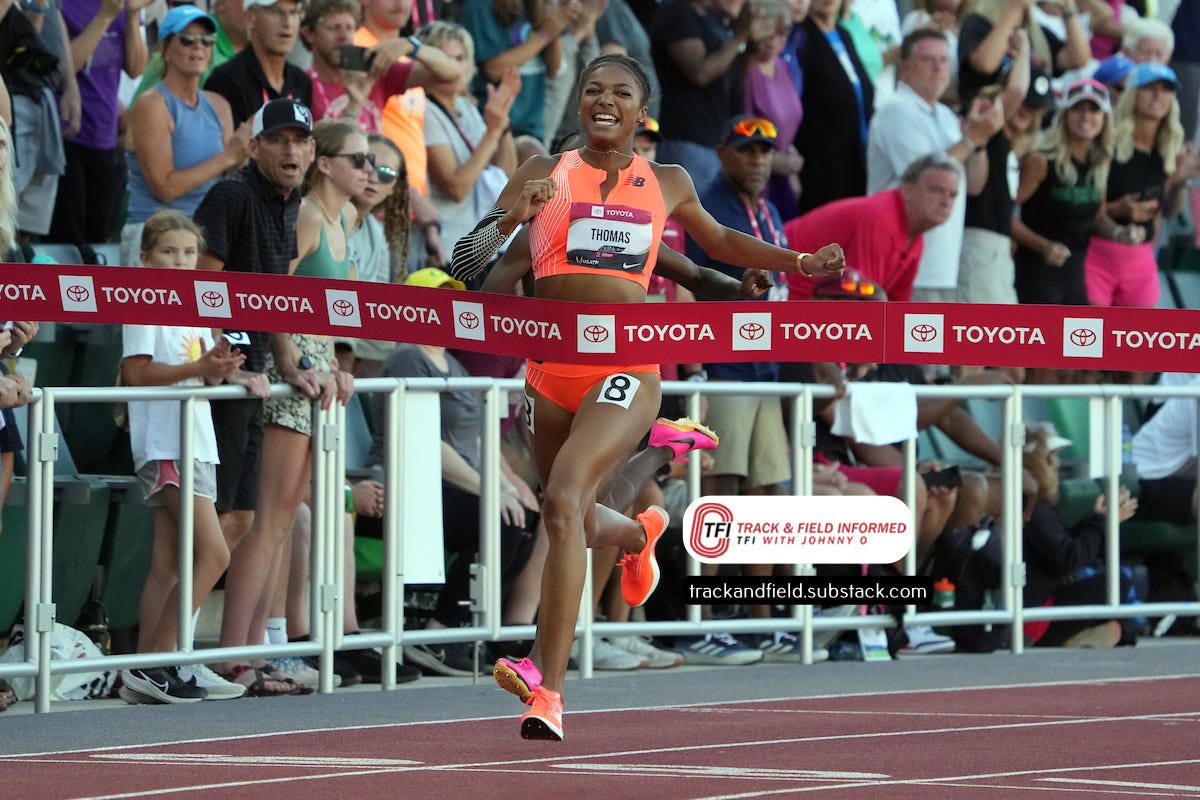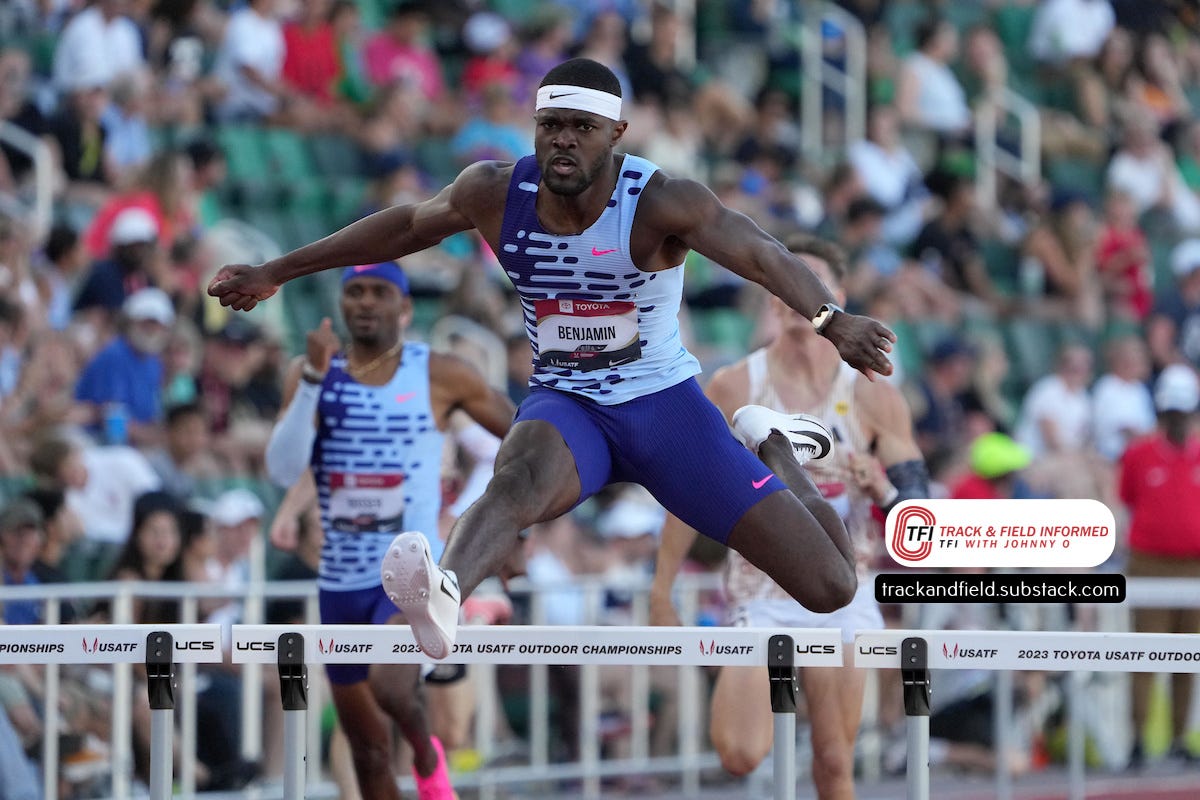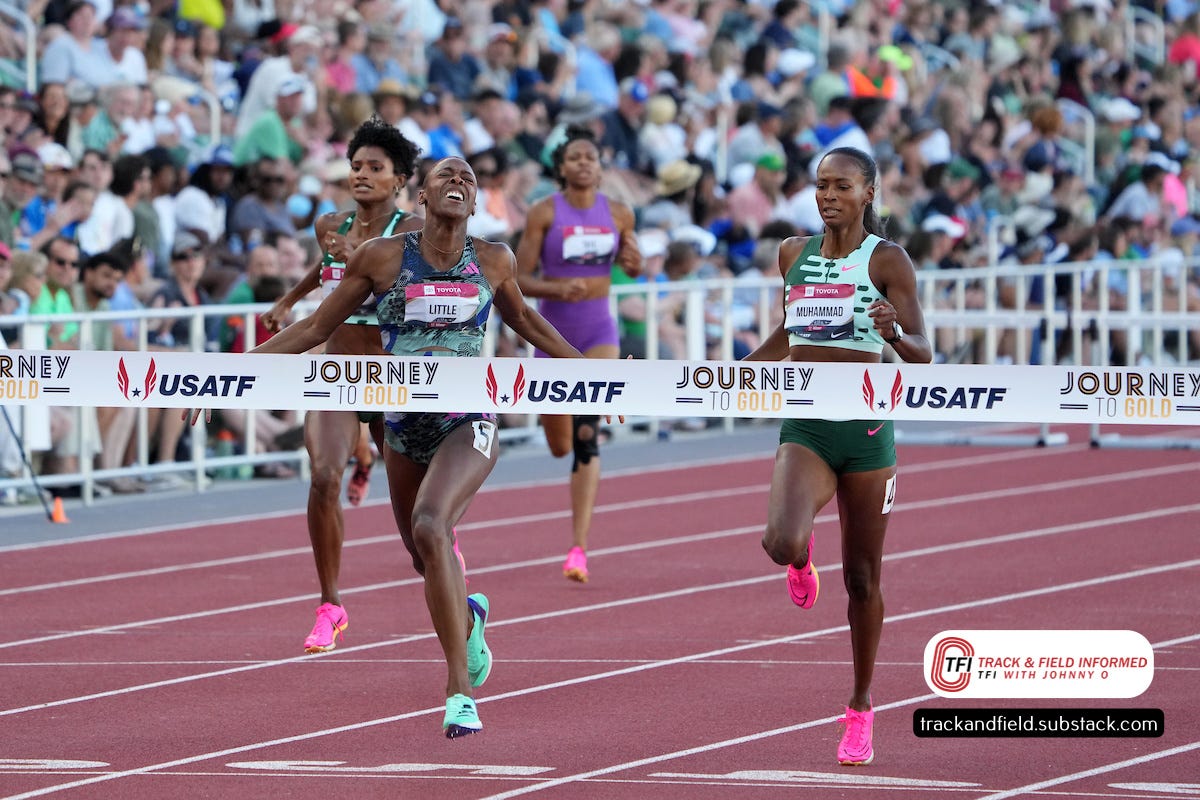Thomas caps comeback from injury with 200 win at USATF Champs
Sprinter's rise and more top performances conclude the four-day run-up to World meet

EUGENE, Oregon — Gabby Thomas has experienced the gamut of emotions competing in national championship track and field meets at the University of Oregon’s Hayward Field during the past three seasons.
Two years ago, she was one of the biggest surprises of the U.S. Olympic Trials when she cut half a second from her pre-meet best in the 200 meters and won the women’s final in what was then the third-fastest time ever run.
But last year, after validating her performance in the Olympic Trials with a bronze medal in the Olympic Games in Tokyo the previous summer, she finished eighth — and last — in the women’s 200 in the USA Track & Field Outdoor Championships after an injured hamstring prevented her from being at full strength in that meet.
Fast forward to the USA Track & Field Outdoor Championships on Sunday when Thomas pulled away from the rest of the field in the final 70 meters of the 200 to win the race in a meet-time of 21.60 seconds that was the sixth-fastest time in history and solidified her hold on fourth on the all-time world performer list.
Sha’Carri Richardson, winner of the 100 on Friday, finished second in a personal best of 21.94, followed by Kayla White in a personal best of 22.01, and defending champion Abby Steiner in 22.07.
Richardson had run a wind-aided — but incredibly easy looking — 21.61 in her first-round heat on Saturday. But Thomas countered with a 21.86 clocking in the second semifinal on Sunday after Richardson had won the first one in 22.18.
In the final that was run about an hour and 25 minutes later, Richardson, running in lane five, had a half-stride lead over second-place Thomas in lane eight when they came off the turn. But Thomas drew even with Richardson with 70 meters remaining and she simply ran away from her and the rest of the field while trimming a hundredth of a second from her previous best she had set in the Olympic Trials.
“After the turn, I definitely had my peripheral vision on her,” Thomas said about Richardson. “I knew she had come off the turn with me or ahead of me so I was going to have to switch gears a couple of times. I wanted to catch her, especially after watching her prelim. So I had to dig down deep to beat her.”
Richardson had used her superior top-end speed to record times of 10.71 (personal best), 10.75, and 10.82 during the three rounds of the 100. And after her 21.61 and 22.18 efforts in the first two rounds of the 200, it’s possible that all of that fast running in a short period of time took a toll in the final as TeeTee Terry and another sprinter were seen helping a weary-looking Richardson through the mixed zone adjacent to the track after her semifinal.
Knowing the tight time schedule for the USATF meet, Thomas had run a pair of 400 races earlier this season — including a 49.68 clocking in late April — to build up her endurance.
“I got the [race] schedule a while ago,” she said. “We knew what was going to happen. We knew it was going to be tight. We knew it was going to be tough. But I knew it wasn’t necessarily going to be the fastest girl who was going to get to the line first. We knew it was going to be whoever could handle two rounds back-to-back.”
The 26-year-old Thomas then added that the victory was “really gratifying. I’ve worked really hard and making a comeback after a tough year with an injury is mentally and emotionally satisfying. This means a lot.”
Rai Benjamin might have edged Thomas — statistically speaking — for the best performance of the day on Sunday. But while Thomas entered the meet confident of running well, intermediate hurdler Benjamin did not know what to expect as he had been dealing with an issue with his left hamstring that he said had prevented him from doing any serious running for the previous eight weeks.
Nonetheless, he uncorked a masterpiece in the final of the 400 hurdles when his winning time of 46.62 seconds was the fifth-fastest performance in history and the second-fastest of his career.
CJ Allen finished a distant second in 48.18, followed by World Championship bronze medalist Trevor Bassitt at 48.26.
The 25-year-old Benjamin, who lowered his U.S. record to 46.17 while finishing second behind the epic world record of 45.94 that Norwegian Karsten Warholm set in the Olympic Games in Tokyo, got off to a good start on Sunday, yet Allen wasn’t far behind him as they entered the second turn. But Benjamin had a substantial lead over Allen as he entered the home straightaway and he continued to motor away from him down the stretch.
“I think I had a really great base this fall,” Benjamin said when asked how he had run so well given the circumstances, “like a phenomenal base this fall and it’s hard to lose that. We did a lot of different things to get that different side of that engine going. I’m glad we didn’t do a lot of speed work this fall. The idea was to go strength and then incorporate the speed later… We did a lot of things I did not like, but I’m happy I did that because it’s showing me now that I have the foundation to fall back on.”

Ryan Crouser, Katie Moon, Brooke Andersen, and Erriyon Knighton produced some of the other top winning performances on Sunday, which was the final day of the four-day national championships which selected most of the U.S. team that will compete in the World Athletics Championships in Budapest, Hungary from Aug. 19-27. Some selections will be made in the next few weeks based on a variety of factors, including where athletes fall in global rankings compiled by World Athletics.
Crouser, the defending World and two-time defending Olympic champion in the men’s shot put, won that event with a best of 22.86 meters (75 feet). Josh Awotunde finished second at 22.10 (72-6¼), followed by Payton Otterdahl at 22.09 (72-5¾), and Joe Kovacs at 21.90 (71-10¼).
Awotunde and Kovacs had finished third and second, respectively, in World Championships last year.
As the defending champion, Crouser has a wild-card entry into the World Championships so the U.S. will have four entries in the event in Budapest.
In addition to his top mark, world-record holder Crouser also had a 22.82 (74-10½) effort in the first round and a 22.38 (73-5¼) put in the fourth.
Moon was a runaway winner in the women’s pole vault as she cleared a yearly world-leading height of 4.90 (16-0¾) before missing three times at what would have been a national record of 5.01 (16-5¼).
Sandi Morris finished second after clearing 4.61 (15-1½) on her first attempt. With a spot on the U.S. team secured, Morris then retired from the competition. Hana Noll, who recently graduated from Capital High School in Olympia, Washington, also cleared 4.61 on her first attempt, but she finished third on the tiebreaker because she took more attempts during the competition than did Morris.
Bridget Williams also cleared 4.61, but she placed fourth because she had more total attempts that Moll.
Moon, the defending Olympic and World champion, opened up her portion of the competition by clearing 4.51 (14-9½) on her first attempt before clearing 4.61 (15-1½) on her second try. She was actually in third place in the standings at that point because Morris and Noll had made 4.61 on their first attempts.
But after Moll missed all three of her attempts at 4.66 (15-3½), Moon clinched the victory with a first-attempt clearance of 4.71 (15-5½). She then cleared 4.83 (15-10) and 4.90 (16-0¾) on her first attempts before missing three times at 5.01.
Andersen and DeAnna Price, winners of the last World titles in the women’s hammer throw, waged a back-and-forth battle in that event before Andersen emerged with her eighth victory in nine meets this season.
Andersen’s best throw of 78.65 (258-0) came in the fourth round, a minute or so after Price had taken the lead with a season best of 78.18 (256-6). Janee’ Kassanavoid, the bronze medalist in the World Championships last year, placed third at 76.44 (250-9), followed by Jillian Shippee in fourth with a personal best of 74.93 (245-10).
Those four athletes are scheduled to represent the U.S. in the World Championships in Budapest because Andersen has a wild-card entry into the meet as the defending World champion.
Price had taken the lead in the second round with a throw of 75.96 (249-2), but Andersen had regained the lead in the third round with a toss of 76.53 (251-1).
Price then drew a big ovation from the crowd with her season best before Andersen topped that effort on the following throw.
“It’s just such a high-value comp,” Andersen said when asked if having a bye into the World Championships helped her to relax. “Like [the announcer] said plenty of times today, that was one of the deepest fields in history… So I just tried to take it as it came. I knew that I didn’t have to win, but obviously I still wanted to do my best that I could. That kind of helps me to relax a little bit, but I still have that drive in me that I’m never really satisfied.”

Knighton won a highly anticipated men’s 200 meters with a season best of 19.72 seconds. The bronze medalist in the World Championships ran the turn well and then maintained his speed down the home straightaway to defeat second-place Kenny Bednarek by a tenth of a second.
Courtney Lindsey of Texas Tech University placed third in a personal best of 19.85 to finish a hundredth of a second in front of defending World 100-meter champion Fred Kerley, who had hoped to make the U.S. team so he could attempt to win the 100 and 200 in Budapest.
Although Kerley made up ground on Bednarek and Lindsey in the home straightaway, he ran the turn so poorly that he was too far behind them to catch either of them.
The men’s 110-meter high hurdles was the final event of the meet, but it lost some of its luster when two-time defending World champion Grant Holloway did not run in the final after winning his semifinal earlier in the day.
Holloway’s absence was not a shock, as he was not required to run in the final because of his defending World champion status. But the race wasn’t as deep without him as Daniel Roberts placed first in 13.05, followed by Cordell Tinch of Pittsburg State University in 13.08, and Freddie Crittenden in 13.23.
Trey Cunningham, silver medalist in last year’s World Championships, placed fifth in 13.29 while Devon Allen did not start his semifinal after narrowly advancing out of his heat on Saturday with a fourth-place finish.
It was the second consecutive title for Roberts, while Tinch’s runner-up finish continued a season in which he has gone from someone who was out of track and field for three years to now being a member of a U.S. team in an event in which the country is particularly deep.
Finals were contested in eight other events on Sunday.
Olympic champion Valarie Allman won the discus, Shamier Little took the women’s 400 hurdles, and Tara Davis-Woodhall won the women’s long jump.
Allman had a solid, but not great meet by her standards, yet she still won by a large margin as her best of 67.66 (222-0) was well ahead of second-place Lagi Tausaga-Collins’ personal best of 65.46 (214-9).
Elena Bruckner finished third at 58.33 (191-4).
Little won the 400 hurdles in 53.34 after winning a hard-fourth, homestretch battle with World Championship bronze medalist Dalilah Muhammad, who ran 53.53. Anna Cockrell finished third in 54.24.
The U.S. could have four entrants in the 400 hurdles in Budapest if defending champion Sydney McLaughlin-Levrone decides to run the 400 hurdles instead of the 400 in the global title meet in the Hungarian capital.

Davis-Woodhall was very happy about her victory in the women’s long jump as she had fouled on all three of her attempts in the meet last year. She hit her winning jump of 6.87 (22-6½) in the second round and she also had efforts of 6.79 (22-3½) in the third round and 6.77 (22-2½) in the fourth.
Quanesha Burks finished second at 6.82 (22-4½), followed by Jasmine Moore at 6.74 (22-1½).
JuVaughn Harrison and Shelby McEwen each cleared 2.26 (7-5) in the high jump, but Harrison ended up winning the event because he cleared that height his first attempt and McEwen made it on his second try. Vernon Turner finished third at 2.21 (7-3).
Three other jumpers cleared 2.21, but Turner was awarded third place because he had fewer attempts during the competition than the other three competitors.
Harrison’s win in the high jump followed a third-place finish in the long jump on Saturday.
The four other finals contested on Sunday were in the women’s and men’s 800 and 5,000 meters, respectively.
Nia Akins won the women’s 800 in 1:59.50 after outkicking Raevyn Rogers in the home straightaway.
Rogers, who won the bronze medal in the Olympics in 2021 by moving from seventh place to third in the home straightaway, placed second in 1:59.83, followed by Kaela Edwards in 2:00.52.
Ajee Wilson, who won the 800 in the World Athletics Indoor Championships last year, faded during the last lap and finished eighth in 2:05.88.
Like Akins in the women’s race, Bryce Hoppel used a powerful finish to win the men’s 800. He clocked 1:46.20, followed by Isaiah Harris in 1:46.68, and Clayton Murphy in 1:46.82.
The men’s and women’s 5,000 meters were both fairly tactical races won by Abdihamid Nur and Elise Cranny, respectively.
Nur ran 13:24.37, followed by Paul Chelimo in 13:24.90, and Sean McGorty in 13:25.98. McGorty had also finished third in the 10,000 on Thursday.
Grant Fisher, the U.S. record holder, did not run in the race due to an injury he had aggravated when he placed fourth in the 10,000.
Cranny won the women’s 5,000 in 14:52.66, followed by Alicia Monson in 14:55.10, and Natosha Rogers in a personal best of 14:55.39.
Cranny, Monson, and Rogers had also swept the first three places in the women’s 10,000 meters on Thursday.



